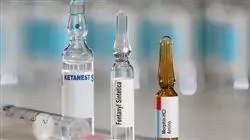University certificate
The world's largest faculty of medicine”
Introduction to the Program
Get up to date on the most current methods of Assessment of the Poisoned Patient, implemented in the emergency department"

When the patient arrives at the emergency room due to poisoning, the health professional must follow an initial protocol that allows him to assess the need for Life Support and apply the ABCDE rule, as well as assess the level of consciousness using the Glasgow scale and place a venous line if possible.
Therefore, the specialist will act in a timely manner depending on the results of this assessment and the level of consciousness of the patient to determine a diagnosis of suspected poisoning and make the appropriate hypotheses of the case.
With this Postgraduate diploma, the graduate will have the knowledge and skills needed to deal with Toxicological Emergencies caused by Drugs of Abuse. For this, TECH has prepared an academic itinerary composed of 3 study modules that bring together the topics in groups about the Assessment of the Poisoned Patient, Life Support and Toxicology for this type of substances.
In this syllabus, the student will find a series of relevant aspects, advances and innovations in the subject that will allow them to provide hemodynamic stability and instability in the poisoned patient. They will learn about poisoning by synthetic drugs, Toxicomania, abstinence syndromes. It will deal with sexual crimes, drug traffickers, reinsertion, among other related factors, reaching conclusions and key aspects to remember in each group of topics.
All this can be studied completely online, from a device of your choice with Internet connection. This will allow them to evolve in their academic journey progressively without complications, accessing the platform at any time of the day and enjoying a variety of multimedia resources: video summaries, complementary readings, quick action guides, images, etc., which will make the whole process much more dynamic.
You will implement the most advanced decontamination procedures in acute poisonings"
This Postgraduate diploma in Toxicological Emergencies caused by Drugs of Abuse contains the most complete and up-to-date scientific program on the market. The most important features include:
- The development of practical cases presented by experts in Toxicology in the Emergency Room
- The graphic, schematic and practical contents with which it is conceived
- scientific and practical information on those disciplines that are essential for professional practice
- Practical exercises where the self-assessment process can be carried out to improve learning
- Its special emphasis on innovative methodologies
- Theoretical lessons, questions to the expert, debate forums on controversial topics, and individual reflection assignments
- Content that is accessible from any fixed or portable device with an Internet connection
You will undertake exploration procedures of the patient poisoned by Drugs of Abuse, determining the type of toxicity present: hepatic, renal, cardiac or respiratory"
The program’s teaching staff includes professionals from the sector who contribute their work experience to this training program, as well as renowned specialists from leading societies and prestigious universities.
Its multimedia content, developed with the latest educational technology, will allow the professional a situated and contextual learning, that is, a simulated environment that will provide an immersive training programmed to train in real situations.
The design of this program focuses on Problem-Based Learning, in which the professional will have to try to solve the different professional practice situations that will arise throughout the academic course. For this purpose, the student will be assisted by an innovative interactive video system created by renowned experts.
With the study of this Postgraduate diploma you will get a complete vision of the treatment of poisoning"

Everything is an advantage when studying with TECH! This 100% online Postgraduate diploma will provide you with the most updated content and the most comfortable and safe methodology"
Why study at TECH?
TECH is the world’s largest online university. With an impressive catalog of more than 14,000 university programs available in 11 languages, it is positioned as a leader in employability, with a 99% job placement rate. In addition, it relies on an enormous faculty of more than 6,000 professors of the highest international renown.

Study at the world's largest online university and guarantee your professional success. The future starts at TECH”
The world’s best online university according to FORBES
The prestigious Forbes magazine, specialized in business and finance, has highlighted TECH as “the world's best online university” This is what they have recently stated in an article in their digital edition in which they echo the success story of this institution, “thanks to the academic offer it provides, the selection of its teaching staff, and an innovative learning method aimed at educating the professionals of the future”
A revolutionary study method, a cutting-edge faculty and a practical focus: the key to TECH's success.
The most complete study plans on the university scene
TECH offers the most complete study plans on the university scene, with syllabuses that cover fundamental concepts and, at the same time, the main scientific advances in their specific scientific areas. In addition, these programs are continuously being updated to guarantee students the academic vanguard and the most in-demand professional skills. In this way, the university's qualifications provide its graduates with a significant advantage to propel their careers to success.
TECH offers the most comprehensive and intensive study plans on the current university scene.
A world-class teaching staff
TECH's teaching staff is made up of more than 6,000 professors with the highest international recognition. Professors, researchers and top executives of multinational companies, including Isaiah Covington, performance coach of the Boston Celtics; Magda Romanska, principal investigator at Harvard MetaLAB; Ignacio Wistumba, chairman of the department of translational molecular pathology at MD Anderson Cancer Center; and D.W. Pine, creative director of TIME magazine, among others.
Internationally renowned experts, specialized in different branches of Health, Technology, Communication and Business, form part of the TECH faculty.
A unique learning method
TECH is the first university to use Relearning in all its programs. It is the best online learning methodology, accredited with international teaching quality certifications, provided by prestigious educational agencies. In addition, this disruptive educational model is complemented with the “Case Method”, thereby setting up a unique online teaching strategy. Innovative teaching resources are also implemented, including detailed videos, infographics and interactive summaries.
TECH combines Relearning and the Case Method in all its university programs to guarantee excellent theoretical and practical learning, studying whenever and wherever you want.
The world's largest online university
TECH is the world’s largest online university. We are the largest educational institution, with the best and widest online educational catalog, one hundred percent online and covering the vast majority of areas of knowledge. We offer a large selection of our own degrees and accredited online undergraduate and postgraduate degrees. In total, more than 14,000 university degrees, in eleven different languages, make us the largest educational largest in the world.
TECH has the world's most extensive catalog of academic and official programs, available in more than 11 languages.
Google Premier Partner
The American technology giant has awarded TECH the Google Google Premier Partner badge. This award, which is only available to 3% of the world's companies, highlights the efficient, flexible and tailored experience that this university provides to students. The recognition as a Google Premier Partner not only accredits the maximum rigor, performance and investment in TECH's digital infrastructures, but also places this university as one of the world's leading technology companies.
Google has positioned TECH in the top 3% of the world's most important technology companies by awarding it its Google Premier Partner badge.
The official online university of the NBA
TECH is the official online university of the NBA. Thanks to our agreement with the biggest league in basketball, we offer our students exclusive university programs, as well as a wide variety of educational resources focused on the business of the league and other areas of the sports industry. Each program is made up of a uniquely designed syllabus and features exceptional guest hosts: professionals with a distinguished sports background who will offer their expertise on the most relevant topics.
TECH has been selected by the NBA, the world's top basketball league, as its official online university.
The top-rated university by its students
Students have positioned TECH as the world's top-rated university on the main review websites, with a highest rating of 4.9 out of 5, obtained from more than 1,000 reviews. These results consolidate TECH as the benchmark university institution at an international level, reflecting the excellence and positive impact of its educational model.” reflecting the excellence and positive impact of its educational model.”
TECH is the world’s top-rated university by its students.
Leaders in employability
TECH has managed to become the leading university in employability. 99% of its students obtain jobs in the academic field they have studied, within one year of completing any of the university's programs. A similar number achieve immediate career enhancement. All this thanks to a study methodology that bases its effectiveness on the acquisition of practical skills, which are absolutely necessary for professional development.
99% of TECH graduates find a job within a year of completing their studies.
Postgraduate Diploma in Toxicological Emergencies caused by Drugs of Abuse
Dive into the exciting field of Toxicological Emergencies caused by Drugs of Abuse with TECH Global University's Postgraduate Diploma program. Designed for healthcare professionals looking to specialize in the identification and management of psychoactive substance intoxications, this course will provide you with the knowledge and skills necessary to effectively address critical situations. The online modality of this program offers you the flexibility you need to advance your career without interrupting your daily responsibilities. At TECH Global University, we understand the importance of providing quality education in an accessible manner. With this Expert postgraduate degree, you will have the freedom to access specialized content from any location and at a time that best suits your schedule.
The best education in toxicology you can find at TECH
Discover the benefits of learning in a virtual environment, interacting with experts and professionals in the sector. This program will not only provide you with solid theoretical knowledge, but will also allow you to apply it in practical situations and real clinical cases. Focus on the study of psychoactive substances, understand the mechanisms of toxicity, learn to conduct comprehensive clinical assessments and develop effective intervention strategies. This program addresses critical topics such as identifying symptoms of intoxication, life support measures and the latest therapeutic interventions. By joining TECH Global University, you will benefit from the experience of healthcare professionals and toxicology experts. Interaction with your peers in a virtual environment will enrich your learning through discussions, case analysis and hands-on projects. Excel in the field of Toxicological Emergencies caused by Drugs of Abuse by graduating with specialized skills and up-to-date knowledge. This expert will give you the competitive edge you need to meet the challenges and advance in this dynamic and challenging industry. Get ready to take your career to the next level. Join the Postgraduate Diploma in Toxicological Emergencies caused by Drugs of Abuse at TECH Global University. enroll now and take the step toward success in the medical field!







